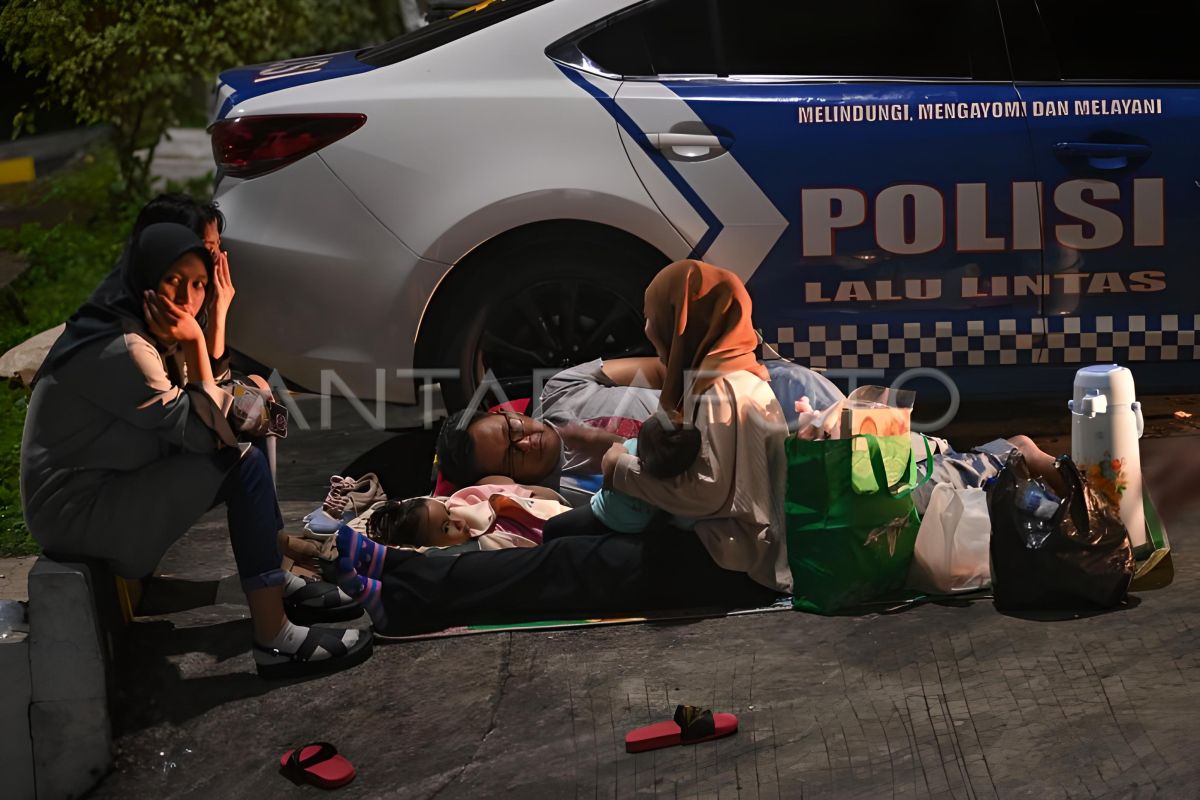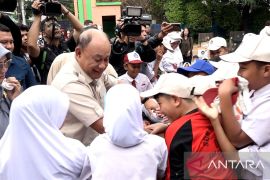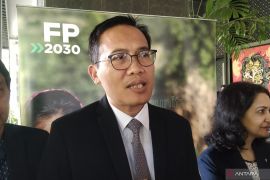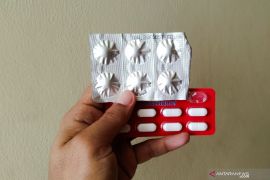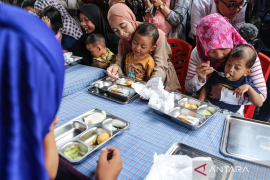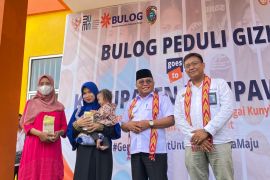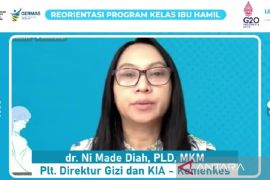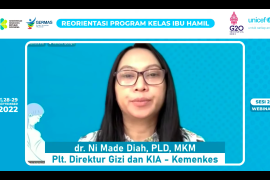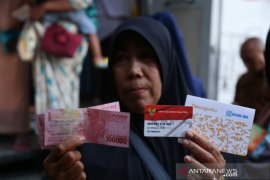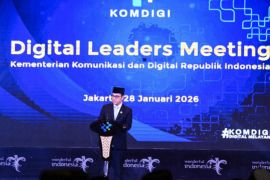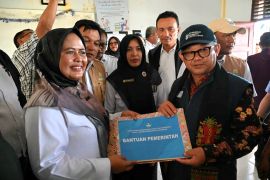Many people hope to be able to gather with their families while enjoying special dishes after month-long fasting during Ramadan.
However, in order to arrive in their hometowns healthy and safe, the people must build their stamina by staying healthy and fit.
According to government spokesperson for COVID-19 Handling, Reisa Broto Asmoro, the first preparation that must be ensured is the travelers’ health condition. Travelers can work on improving their health ahead of time by routinely engaging in light exercises for at least 15 to 30 minutes to avoid fatigue during long drives.
Light exercise must be complemented with the fulfillment of balanced nutrition. For instance, by consuming a diet rich in fruits and vegetables to meet the body's fiber and mineral requirements. Fulfilling the requirement for carbohydrates through the consumption of rice, potatoes, or bread in sufficient quantities accompanied by the intake of protein sources, such as eggs, fish, or meat, is also important.
In fact, the community can visit the health facility for a health check-up. From the result of the check-up, the public can gain a clear understanding of the needs of their body and will be able to prepare supplies, such as medicine, vitamins, and food, during homecomings.
In addition, quality and sufficient sleep can help them to become more focused on driving. Normally, the duration of quality sleep is seven to eight hours each day.
After requisite health preparations, travelers must focus on road safety during homecoming. The farther the destination taken, the greater the risk of traffic accidents. Travelers are suggested to not underestimate rest, especially when they feel sleepy or tired.
Asmoro reminded travelers to not hurry to arrive at their hometowns. Car drivers are advised to rest for at least 15 minutes every four hours at the maximum, while motorcyclists are advised to stop every two hours to stretch so as to avoid body stiffness due to being seated in the same position for hours.
Once they sense tiredness, travelers must immediately look for the nearest rest area. However, National Police Chief General Listyo Sigit Prabowo advised travelers to not use the rest area for too long to avoid congestion there since only limited ones are available.
Even if the rest area is full, he urged travelers to make the most of the restroom provided by the police or other parties.
Another option is to leave the toll road briefly to have more options to take rest and reduce buildup of vehicles at the rest area inside the toll road. Travelers, who choose to rest outside the toll road, will not be asked to pay again and can immediately continue their journey on the toll road.
Based on an evaluation of last year's homecoming, Coordinating Minister for Human Development and Culture, Muhadjir Effendy, provided tips for anticipating increased traffic accidents during homecoming by bringing a backup driver. Thus, each driver can take turns to rest and can share the driving time.
“Safety is number one. Meeting with families in our hometown will only be meaningful if we are safe during the travel. The government is trying really hard to minimize the number of accidents, especially those that were fatal during this homecoming," he remarked.
Related news: President Jokowi wants palace staff celebrate Eid with their families
Take care of mother and children
Apart from the driver factor, families should not ignore the health of mothers and children during homecoming trips since many pregnant women and children take long journeys by car.
Head of the National Population and Family Planning Agency (BKKBN), Hasto Wardoyo, drew attention to several cases of pregnant women experiencing bleeding that triggered miscarriages during homecoming trips.
Since pregnancy is a vulnerable period, expectant mothers, especially those who are already heavily pregnant, should avoid dusty and bumpy rides over a long-distance trip to avoid fatigue that can be one of the reasons for a miscarriage.
In order to maintain the health of pregnant women, Wardoyo deems it necessary to consult with an obstetrician before leaving for homecoming to get advice, recommendation, and medication needed by pregnant women during homecoming.
For instance, during pregnancy in the first trimester, pregnant women often show symptoms, such as nausea, severe vomiting, or dizziness, during the day. Thus, they are not recommended to fast since it can trigger dehydration and disrupt eating patterns. Hence, adequate nutritional intake for both mother and the baby must be maintained.
Member of the Indonesian Pediatrician Association (IDAI) Child Protection Task Force, Hari Wahyu Nugroho, suggests pregnant women to consume foods containing carbohydrates, such as bread, and animal protein, such as milk or fish. By maintaining a balanced nutritional intake, their immunity will be able to ward off diseases, such as cough and common cold.
Apart from maintaining the health of pregnant women, children’s health cannot be overlooked. Parents must pay attention to their sleep quality that can potentially change during the trip or when they arrive at their destination. If sleep hours are reduced or disrupted, it can damage the quality of a child's sleep and cause decreased immunity.
Related news: Jokowi communicates with ministers to monitor homecoming flows
COVID-19 transmission
During homecoming, the public must remember that COVID-19 still lingers. Hence, they cannot ignore health protocols, let alone gather in a large crowd, such as at the rest area. Masks are still considered effective to reduce virus transmission that may transmit through droplets. Self-protection must also be maintained by diligently washing hands.
Asmoro called on travelers to avoid crowds and keep their distance in a crowd, as they are unaware of each other’s health status.
"If you already feel the symptoms of COVID-19, namely cough, runny nose, or fever, it is better to make sure to carry out either an antigen or PCR test at the nearest health facility to make sure of our condition,” she stated.
Meanwhile, epidemiologist from the University of Indonesia's Public Health Faculty, Iwan Ariawan, stated that vaccination is still effective in handling COVID-19 transmission. Vaccines help the body to form antibodies to avoid severe symptoms or death.
These various tips are expected to serve as a lesson for all parties to realize safe and healthy Eid homecoming. It is also hoped that COVID-19 cases will not spread after a big gathering, with all parties’ compliance to health protocols during this annual event.
Related news: TNI, Polri assure homecomers' safety during travel: Police Chief
Translator: Hreeloita Dharma S, Resinta S
Editor: Yuni Arisandy Sinaga
Copyright © ANTARA 2023
